| Listing 1 - 10 of 20 | << page >> |
Sort by
|
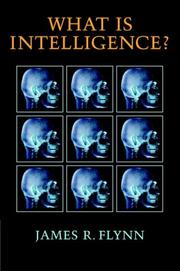
ISBN: 9780521741477 9780521880077 0521880076 9780511605253 0511605250 9780511604959 0511604955 9780511601507 0511601506 9780511603099 0511603096 0511699417 1107184134 1282318012 9786612318016 0511604653 0511604122 0511603347 0511602561 0521741475 9780511699412 9781107184138 9781282318014 6612318015 9780511604652 9780511604126 9780511603341 9780511602566 Year: 2007 Publisher: Cambridge Cambridge University Press
Abstract | Keywords | Export | Availability | Bookmark
 Loading...
Loading...Choose an application
- Reference Manager
- EndNote
- RefWorks (Direct export to RefWorks)
The 'Flynn effect' refers to the massive increase in IQ test scores over the course of the twentieth century. Does it mean that each generation is more intelligent than the last? Does it suggest how each of us can enhance our own intelligence? Professor Flynn is finally ready to give his own views. He asks what intelligence really is and gives a surprising and illuminating answer. This expanded paperback edition includes three important new essays. The first contrasts the art of writing cognitive history with the science of measuring intelligence and reports data. The second outlines how we might get a complete theory of intelligence, and the third details Flynn's reservations about Gardner's theory of multiple intelligences. A fascinating book that bridges the gulf separating our minds from those of our ancestors a century ago, and makes an important contribution to our understanding of human intelligence.
Intellect. --- Experimentele psychologie --- denken, begripsvorming en problem solving. --- Intellect --- #KVHB:Intelligentie --- Human intelligence --- Intelligence --- Mind --- Ability --- Psychology --- Thought and thinking --- Cognitive psychology --- Denken, begripsvorming en problem solving. --- Health Sciences --- Psychiatry & Psychology
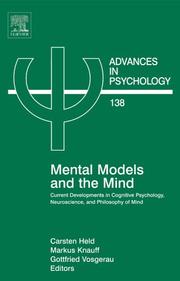
ISBN: 9780444520791 0444520791 9786610631162 1280631163 0080459013 9780080459011 Year: 2006 Publisher: Amsterdam ; Boston : Elsevier,
Abstract | Keywords | Export | Availability | Bookmark
 Loading...
Loading...Choose an application
- Reference Manager
- EndNote
- RefWorks (Direct export to RefWorks)
""Cognitive psychology,"" ""cognitive neuroscience,"" and ""philosophy of mind"" are names for three very different scientific fields, but they label aspects of the same scientific goal: to understand the nature of mental phenomena. Today, the three disciplines strongly overlap under the roof of the cognitive sciences. The book's purpose is to present views from the different disciplines on one of the central theories in cognitive science: the theory of mental models. Cognitive psychologists report their research on the representation and processing of mental models in human memory. Cognitive
Cognitive neuroscience --- Cognitive psychology --- Philosophy of mind --- Experimentele psychologie --- Denken, begripsvorming en problem solving. --- Psychology, Cognitive --- Cognitive science --- Psychology
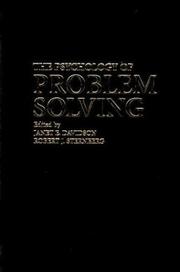
ISBN: 1107130115 0511063148 1280433043 0511615779 0511180977 0511205228 0511308043 0511071604 9780511063145 9780511180972 9780511615771 9781280433047 9780511071607 9786610433049 6610433046 0521793335 0521797411 9780521793339 9780521797412 9781107130111 9780511205224 9780511308048 Year: 2003 Publisher: Cambridge, UK New York Cambridge University Press
Abstract | Keywords | Export | Availability | Bookmark
 Loading...
Loading...Choose an application
- Reference Manager
- EndNote
- RefWorks (Direct export to RefWorks)
Problems are a central part of human life. The Psychology of Problem Solving organizes in one volume much of what psychologists know about problem solving and the factors that contribute to its success or failure. There are chapters by leading experts in this field, including Miriam Bassok, Randall Engle, Anders Ericsson, Arthur Graesser, Keith Stanovich, Norbert Schwarz, and Barry Zimmerman, among others. The Psychology of Problem Solving is divided into four parts. Following an introduction that reviews the nature of problems and the history and methods of the field, Part II focuses on individual differences in, and the influence of, the abilities and skills that humans bring to problem situations. Part III examines motivational and emotional states and cognitive strategies that influence problem solving performance, while Part IV summarizes and integrates the various views of problem solving proposed in the preceding chapters.
Problem solving. --- Methodology --- Psychology --- Decision making --- Executive functions (Neuropsychology) --- Experimentele psychologie --- denken, begripsvorming en problem solving. --- Health Sciences --- Psychiatry & Psychology
Book
ISBN: 903342052X 9789033420528 Year: 1989 Publisher: Leuven Acco
Abstract | Keywords | Export | Availability | Bookmark
 Loading...
Loading...Choose an application
- Reference Manager
- EndNote
- RefWorks (Direct export to RefWorks)
Bibliografie : p. 211-217 Met reg. Gesteld wordt, dat het kijken naar beelden (en naar audiovisuele beelden in het bijzonder) een vorm van denken is, en dat er met het maken en bekijken van dergelijke beelden diverse vormen van verbeeldend denken zijn gemoeid. Centrale vraag hierbij is, hoe mentale processen als ergens aan denken, iets bedenken of beoordelen door een cineast worden verbeeld en hoe de kijker deze gedachten weet 'af te lezen' uit de bekeken en beluisterde beelden. Aanzet tot een algemene theorie over fotos̕, film- en televisiebeelden.
beeldcultuur --- film --- visuele communicatie --- Film --- film [performing arts] --- Literary semiotics --- Films --- Films cinématographiques --- 316.77 --- 159.955 --- 161/162 --- 316.73 --- 379.823 --- 659.3 --- 798.2 --- Beeldcultuur --- Communicatiesociologie --- Experimentele psychologie --- denken, begripsvorming en problem solving --- denken, begripsvorming en problem solving. --- 316.77 Communicatiesociologie --- Denken, begripsvorming en problem solving. --- film [discipline] --- Cinéma --- Literary semiotics. --- Motion pictures --- beeldcultuur. --- film performing arts. --- film. --- visuele communicatie. --- Aspect social. --- Philosophy. --- Social aspects.
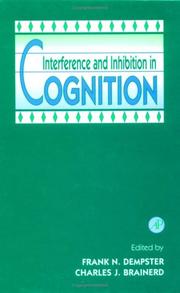
ISBN: 0122089308 9786611058968 1281058963 0080534910 9780080534916 9781281058966 9780122089305 Year: 1995 Publisher: San Diego Academic Press
Abstract | Keywords | Export | Availability | Bookmark
 Loading...
Loading...Choose an application
- Reference Manager
- EndNote
- RefWorks (Direct export to RefWorks)
Life scientists have long been familiar with the notion of interference and inhibition in biological systems 3/4 most notably in the neuron. Now these concepts have been applied to cognitive psychology to explain processes in attention, learning, memory, comprehension, and reasoning. Presenting an overview of research findings in this realm, Interference and Inhibition in Cognition discusses what processes are sensitive to interference, individual differences in interference sensitivity, and how age and experience factor into one's ability to inhibit interference.Key Features
Cognition --- Interference (Perception) --- Inhibition --- Cognition. --- Inhibition. --- Interference (Perception). --- Experimentele psychologie --- denken, begripsvorming en problem solving. --- Perception --- Free will and determinism --- Habit --- Psychology --- Will --- Impulse
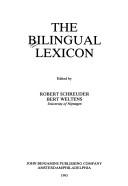
ISBN: 1556195362 9027282854 9786613222220 1283222221 9789027282859 9027241082 9789027241085 9781556195365 9027241104 9789027241108 1556195389 9781556195389 Year: 1993 Volume: 6 Publisher: Amsterdam Benjamins
Abstract | Keywords | Export | Availability | Bookmark
 Loading...
Loading...Choose an application
- Reference Manager
- EndNote
- RefWorks (Direct export to RefWorks)
In the study of bilingualism, the lexical level of language is of prime importance because, in practical terms, vocabulary acquisition is an essential prerequisite for the development of skill in language use; from a theoretical point of view, the mental lexicon, as a bridge between form and meaning, plays a crucial role in any model of language processing. A central issue in this volume is at which level of the bilingual speaker's lexicon languages share representations and how language-specific representations may be linked.The contributors favor a dynamic, developmental perspective on
Bilingualism --- Language and languages --- Languages in contact --- Multilingualism --- Lexicology. --- Lexicology --- Lexicology. Semantics --- Psycholinguistics --- Experimentele psychologie --- denken, begripsvorming en problem solving. --- Bilinguisme --- --Lexicologie --- --Bilingualism --- Bilingualism - Lexicology. --- Lexicologie --- Bilingualism - Lexicology
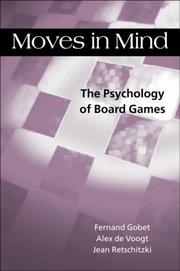
ISBN: 1841693367 0203503635 9780203503638 9781841693361 9786610256181 6610256187 9781135425135 1135425132 9781135425081 1135425086 9781135425128 1135425124 9780415655651 041565565X 1280256184 1841693375 9781841693378 9781280256189 Year: 2004 Publisher: Hove, East Sussex ; New York : Psychology Press,
Abstract | Keywords | Export | Availability | Bookmark
 Loading...
Loading...Choose an application
- Reference Manager
- EndNote
- RefWorks (Direct export to RefWorks)
Board games have long fascinated as mirrors of intelligence, skill, cunning, and wisdom. While board games have been the topic of many scientific studies, and have been studied for more than a century by psychologists, there was until now no single volume summarizing psychological research into board games. This book, which is the first systematic study of psychology and board games, covers topics such as perception, memory, problem solving and decision making, development, intelligence, emotions, motivation, education, and neuroscience. It also briefly summarizes current research in artificia
Board games --- Cognitive psychology. --- Experimentele psychologie --- Psychological aspects. --- denken, begripsvorming en problem solving --- denken, begripsvorming en problem solving. --- Psychology, Cognitive --- Cognitive science --- Psychology --- Move games --- Games --- Gameboards --- Jeu --- Loisir --- Processus cognitif --- Resolution de problemes --- Strategie cognitive --- Jeux de pions. --- Board games. --- Aspect psychologique --- Psychological aspects
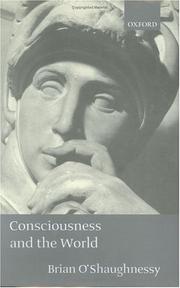
ISBN: 1281989061 9786611989064 0191519480 9780191519482 9780191598135 0191598135 0198238932 0199256721 9780198238935 9781281989062 6611989064 Year: 2000 Publisher: Oxford Clarendon
Abstract | Keywords | Export | Availability | Bookmark
 Loading...
Loading...Choose an application
- Reference Manager
- EndNote
- RefWorks (Direct export to RefWorks)
Brian O'Shaughnessy puts forward a bold and original theory of consciousness, one of the most fascinating but puzzling aspects of human existence. He analyses consciousness into purely psychological constituents, according pre-eminence to its epistemological power; the result is an integrated picture of the conscious mind in its natural physical setting. Consciousness and the World is a rich and exciting book, a major contribution to our understanding of themind.
Consciousness. --- Perception. --- Supraliminal perception --- Cognition --- Apperception --- Senses and sensation --- Thought and thinking --- Mind and body --- Perception --- Philosophy --- Psychology --- Spirit --- Self --- Consciousness --- Philosophical anthropology --- Experimentele psychologie --- denken, begripsvorming en problem solving.
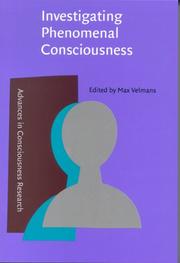
ISBN: 0585461686 9027299994 9786612254987 1282254987 9780585461687 9027251339 9789027251336 1556191936 9781556191930 9789027299994 Year: 2000 Publisher: Amsterdam Benjamins
Abstract | Keywords | Export | Availability | Bookmark
 Loading...
Loading...Choose an application
- Reference Manager
- EndNote
- RefWorks (Direct export to RefWorks)
How can one investigate phenomenal consciousness? As in other areas of science, the investigation of consciousness aims for a more precise knowledge of its phenomena, and the discovery of general truths about their nature. This requires the development of appropriate first-person, second-person and third-person methods. This book introduces some of the creative ways in which these methods can be applied to different purposes, e.g. to understanding the relation of consciousness to brain, to examining or changing consciousness as such, and to understanding the way consciousness is influenced by social, clinical and therapeutic contexts. To clarify the strengths and weaknesses of different methods and to demonstrate the interplay of methodology and epistemology, the book also suggests a number of "maps" of the consciousness studies terrain that place different approaches to the study of consciousness into a broader, interdisciplinary context.(Series A).
Phenomenological psychology. --- Consciousness. --- Apperception --- Mind and body --- Perception --- Philosophy --- Psychology --- Spirit --- Self --- Psychological phenomenology --- Psychology, Phenomenological --- Existential psychology --- Personality --- Phenomenology --- Philosophical anthropology --- Cognitive psychology --- Theory of knowledge --- Experimentele psychologie --- denken, begripsvorming en problem solving.

ISBN: 1282325450 1410604314 9786612325458 0585385165 9780585385167 9780203424964 0203424964 9780805852356 0805852352 9781136608643 1136608648 9781136608599 1136608591 9781136608636 113660863X 9781138135710 1138135712 9780805835182 0805835180 Year: 2009 Publisher: New York, N.Y. Routledge, Taylor and Francis Group
Abstract | Keywords | Export | Availability | Bookmark
 Loading...
Loading...Choose an application
- Reference Manager
- EndNote
- RefWorks (Direct export to RefWorks)
This is the first book to provide a comprehensive overview of the theoretical and methodological approaches to the study of personal epistemology from a psychological and educational perspective. Both theory building and empirical research have grown dramatically in the past decade but, until now, this work has not been pulled together in a single volume. That is the mission of this volume whose state-of-the-art theory and research are likely to define the field for the next 20 years. Key features of this important new book include: *Pioneering Contributors--The book provides c
Educational psychology. --- Knowledge, Theory of. --- Epistemology --- Theory of knowledge --- Philosophy --- Psychology --- Education --- Educational psychology --- Knowledge, Theory of --- #PBIB:2002.3 --- Experimentele psychologie --- denken, begripsvorming en problem solving. --- Cognitive psychology
| Listing 1 - 10 of 20 | << page >> |
Sort by
|

 Search
Search Feedback
Feedback About UniCat
About UniCat  Help
Help News
News